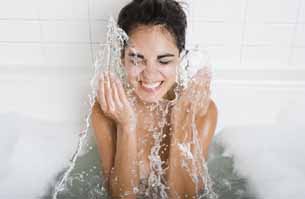Acne is a common ordeal for teenagers. If you too have acne, you’ve come to the right place.
Acne is a common problem among teenagers and often leaves them self-conscious. If you too have acne, you may try all possible home remedies to get rid of the annoying acne or at least make them insignificant. But can we get rid of teenage pimples naturally too?
What causes acne in teenagers?
An increase in the levels of hormones during teenage years causes the sebaceous glands to produce more sebum. The oil clumps with the dead skin cells and other debris, blocking the hair follicles and leading to acne. Acne may not cause serious problems. When left untouched, the pimples or zits will fall off without leaving a scar. However, blocked follicles can get painfully inflamed, and in some situations, may get infected. It can lead to discomfort and may also make the acne more prominent.
The following remedies may help reduce the intensity of teenage acne. The solutions may not provide a complete cure from acne in teenagers but are still worth a try
Wash the face with an oil-free face wash
Buy an oil-free face wash and clean the face twice a day, once in the morning and once in the night. Use only a small quantity to clean the face without scrubbing the skin. Pat dry the skin with a towel instead of wiping it clean. You can pick a face wash that has an exfoliating feature to help remove the layer of dead skin on the surface. Less dead skin and dead cell debris may reduce the chances of clogged follicles. Pick a face wash that contains 5% benzoyl peroxide and use it only once a day for a week. After a week, use it twice a day for up to four or six weeks to attain relief from acne.
Consider zinc products
Research suggests that zinc and its compounds may help reduce the intensity of acne. Topical use of zinc oxide may be helpful as it absorbs oil and reduces the redness of the skin. Oral consumption of zinc may provide relief from acne. However, if the teen is eating a healthy diet, then they may not need zinc supplementation because it is found in a variety of foods, including wheat germ, oatmeal, sesame seeds, poultry products, seafood, and meat.
Vitamins
A study found that those with acne may have low levels of vitamin A and E in their body. Adequate intake of these vitamins may reduce acne and improve the skin condition. A safe and healthy source of vitamin A for a teen is fruits and vegetables.
Honey and cinnamon face mask
Research suggests that a combination of honey and cinnamon powder can work against acne-causing bacteria. Certain natural compounds in these food items may act against the proliferation of Propionibacterium acnes and Staphylococcus epidermidis, the bacteria associated with the formation of acne.
Here is how you can prepare the face mask:
- Mix one teaspoon of cinnamon powder with one tablespoon of honey.
- Wash the face, pat it dry, and apply the mixture evenly on the face.
- Leave it for 20 minutes and wash it off.
Tea tree oil
Research suggests that tea tree oil may reduce the severity of acne among those with mild to moderate acne. Tea tree oil is an essential oil and comes from the leaves of Melaleuca alternifolia, or the tea tree. A study found that the application of 5% topical tea tree oil can help reduce the intensity of acne. Tea tree oil may work slowly, and some experts state that it may require three months of use to show visible results.
Avoid dairy products
Milk may expose a teen to hormones and other compounds that may exacerbate teenage acne. Health experts do acknowledge that dairy products can cause acne in some individuals. Besides the likely presence of hormones, it is not known how and why dairy may cause acne. Avoid dairy for a month or more and observe if there is any difference. If you notice the acne diminishing and the skin improving without dairy in the diet, then your child can permanently stay away from dairy products.
Manage stress
Emotional and mental stress does not cause acne but may aggravate existing acne. Research suggests that the sebaceous glands may be affected by the corticotropin-releasing hormone, a stress hormone in the body. The hormone could lead to excess sebum production, thus increasing the likelihood of acne.
Exercise
Exercise can cause the adrenal glands to produce fewer hormones that trigger acne flare-ups. Regular exercise can also bring down the levels of stress hormones that could cause acne. Exercise has a positive impact on a teenager’s overall health and is worth a try for controlling acne.
Acne may be a cause of concern for the teenager, but it is often a normal part of growing up. Most adults have had to deal with acne during their teenage years. The severity of acne tends to decrease eventually, as the child moves towards the end of their teenage years. Care, a good diet, and a healthy lifestyle and attitude can help the teenager face teenage acne.

